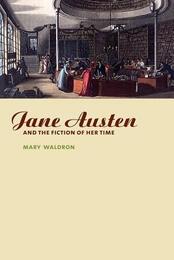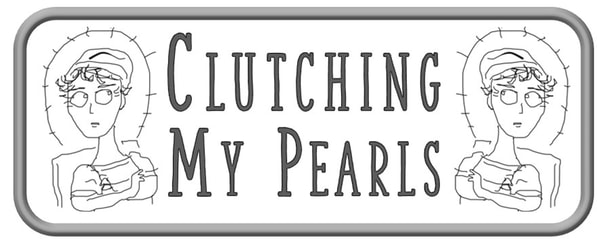| "We are reading Clarentine & are surprised to find how foolish it is. I remember liking it much less on a 2nd reading than at the 1st & it does not bear a 3rd at all. It is full of unnatural conduct & forced difficulties, without striking merit of any kind.” -- Jane Austen to her sister Cassandra, February, 1807 |

As Waldron points out in Jane Austen and the Fiction of her Time, Austen may have drawn from the plot of Clarentine (1796) for Mansfield Park (1814). Clarentine lives in her uncle’s family, is persecuted and harassed by another aunt, “a Mrs. Norris-type figure,” who is afraid she will ensnare her cousin Edgar into marriage since they are growing up under the same roof. Clarentine is “banished to Sidmouth, where she is pursued by an attractive rake.”
 Louis Leopold Boilly, The Effect of Melodrama
Louis Leopold Boilly, The Effect of Melodrama When Clarentine’s London hostess, the vulgar Mrs. Barclay, invites her to go to the theatre, Clarentine is taken aback at Mrs. Barclay’s assumption that she would enjoy such tawdry amusements. “Clarentine stared at this unexpected question.” She excuses herself on the grounds that her (distant and miserably unkind) uncle has just died, and she has no mourning-clothes to wear in public.
When Clarentine is finally dragged -- much against her wishes -- to a public play, she doesn’t even make it through the front door. First she is terrified by the crush of people all around her in the street, then she is assailed with the impertinent remarks of strange men about her beauty, and finally, she is caught up in the surging crowd, “oppressed, staggered and overpowered to so great a degree, that after vainly contending for some time in agonies unspeakable with the fearful apprehensions that seized her, she lost all command over herself, and uttering a piercing shriek, fell back without sense or motion in [her escort’s] arms.” He must haul the “inanimate” heroine into a nearby shop, and then escort her home in a hired coach.

Her extreme delicacy of sentiment means she is unable to explain her reactions to anyone. Anything that reminds her of her guardian, the man she secretly loves -- such as the word “Northamptonshire” -- causes her to blush vividly, but when she isn't blushing, she's crying. Praise of her guardian draws tears from Clarentine’s eyes, praise from him undoes her entirely. Compared to Clarentine, Fanny Price is a stoic. Throughout the novel, if anyone –- cousin, friend, aunt, guardian, admirer, chaperone, lover -- speaks to Clarentine with sincerity, kindness, or concern, or if anyone scolds her, however mildly, she starts to weep, and is usually “quite overpowered” and “unable to speak.” She brings to mind that Tenniel illustration of Alice swimming in a lake of her own tears.
 Thomas Rowlandson, The Comforts of Bath
Thomas Rowlandson, The Comforts of Bath We are also told of Clarentine’s exquisite propriety of conduct, but there are some odd Georgian lapses: While attending that same ball, she watches in amusement as a new friend, Mr. Manners, exposes the foppery of Mr. Westbury: Mr. Manners points out a “poor girl who was extremely deformed and yet dressed in the most extravagant height of the ton” and he asks Mr. Westbury, “what say you to that fair nymph, Westbury?” When Westbury compliments her clothing, without insulting the girl's figure, both Mr. Manners and Clarentine burst into laughter.
Clarentine is more apt to take offense at improper remarks directed at her, rather than at anyone else; if she is, as Waldron contends, a model of “right conduct,” then “right conduct” means being constantly “confused,” or “surprised,” or “taken aback,” by a vulgarity, a too-effusive compliment, a too-familiar greeting, or a too-familiar glance of admiration.
“Could I divine, my beloved Clarentine, what passes in that gentle bosom, and penetrate its secret sorrows [he pleads], with what earnest anxiety would I endeavour to alleviate them! You acknowledge,” added he, “some regard, some esteem for me, but when, when will those sentiments animate again into confidence and affection? You cannot have a grief in which, mysterious as you are, I do not participate; say then, sweetest Clarentine! tell me why that bitter sigh and these involuntary tears?”
Alas, the moment of éclaircissement is delayed for a few hundred more pages, because Clarentine’s rival shows up just at that moment, and the affronted heroine rushes into her room, locks the door and refuses to come down to dinner.
 Proposals of marriage are so difficult to bear! Fanny rejects Henry
Proposals of marriage are so difficult to bear! Fanny rejects Henry “[S]hocked to find she had thus cruelly exposed herself... Clarentine exclaims [through her convulsive sobs] ’Oh! dearest Mrs. Denbigh, ‘how am I ever to meet Mr. Somerset again? Indeed, indeed, I cannot bear to think of it… Where can I conceal my consciousness and my shame?’” She begs Mrs. Denbigh to tell the captain that she does not love him. Better to lose all hope of gaining him, than have him think of her as ill-bred and forward. Mrs. Denbigh refuses: “Be a little rational, and give me no commissions of this sublime, but lying kind.”
Our hero decides to propose to Clarentine by letter, probably because he fears an in-person proposal of marriage might be fatal to this sensitive plant. She accepts by return of post, and though it seems quite unnecessary for her to add that she is crying as she writes--I think he would be in no suspense on that point--she does let him know her eyes are blinded by tears. The fortunate man moves on to pleading with her to set a date for the wedding and contending with her bashful refusals to do so.
So is Clarentine, this sobbing, quivering, bundle of neuroses, really a portrait of the perfect Georgian female? The kind of girl whose example will edify the young female reader, and rouse in her the desire to emulate her virtue? And is Fanny Price also a perfect heroine? Mary Waldron says Fanny is not perfect, and further, she is not intended to be. More about that in future posts.
Click here for a biography of Clarentine's creator, Sarah Burney
Previous post: PIctures of Perfection Next post: Will you be my Valentine?
| In my variation on Mansfield Park, the theatricals at Mansfield do proceed to the dress rehearsal because Sir Thomas does not suddenly return from Antigua. This sends events spinning off on an entirely differently track for Maria Bertram, Henry Crawford, and Mr. Rushworth. Read more about A Contrary Wind and my Mansfield Trilogy here. |

 RSS Feed
RSS Feed